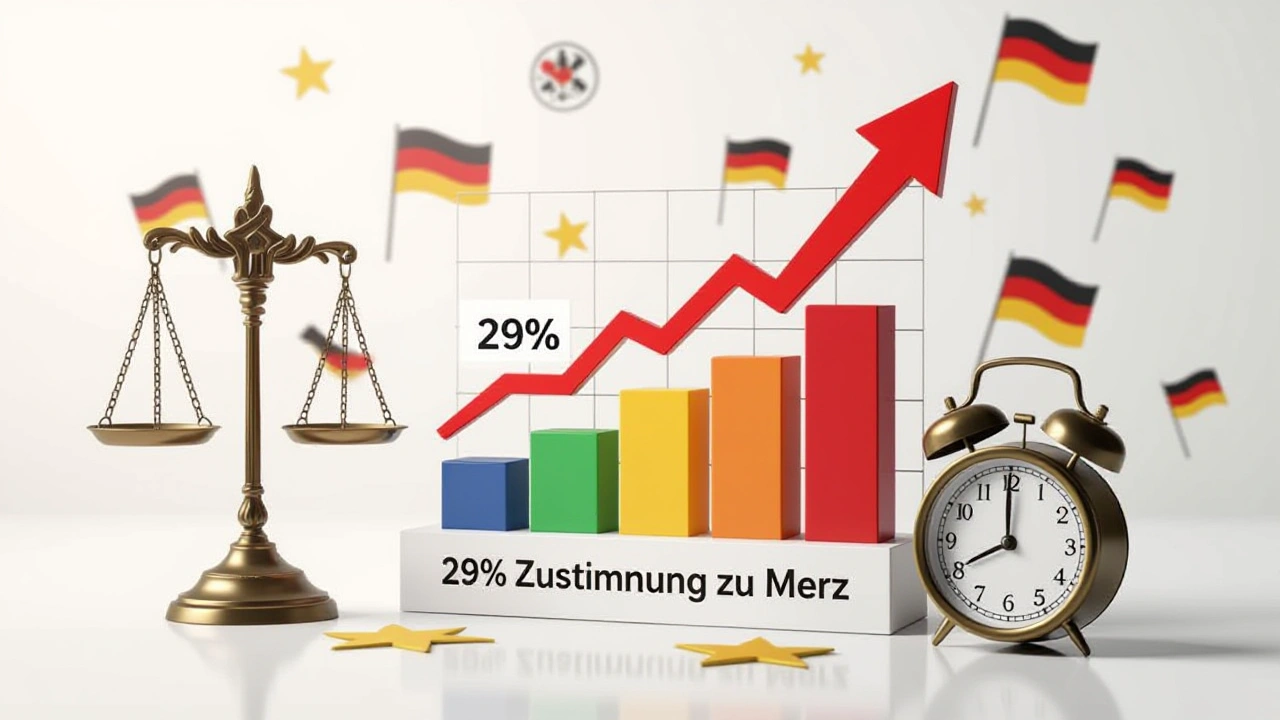Friedrich Merz Poll Numbers - Current Situation and Political Consequences

Friedrich Merz Poll Numbers - Current Situation and Political Consequences#
Merz’s Popularity by Party Preference (September 2025)#
Overall Assessment#
Current polling shows that Friedrich Merz, chairman of the CDU, has reached a historic low point. Only 29% of respondents show approval for his work, representing a dramatic decline compared to previous polls. Satisfaction with his political work stands at merely 32%, and on the sympathy scale, he receives a neutral rating of 0.0. These numbers indicate that Merz is increasingly losing acceptance among the population.
Breakdown by Party#
Approval for Friedrich Merz varies significantly depending on respondents’ party preferences. Among CDU/CSU supporters, satisfaction remains highest, though with a declining trend: 72% of CDU/CSU supporters are satisfied. Among SPD supporters, however, dissatisfaction predominates: 60% are dissatisfied with Merz. AfD supporters are particularly critical of Merz, with 95% dissatisfied and 84% rejecting him. Left party supporters also show little sympathy: 79% criticize his work.
Demographic Differences#
Demographic factors also play a role in Merz’s evaluation. Among men, significantly higher approval is shown: 21% of men prefer him. In contrast, East Germans are particularly critical: 59% reject Merz. These regional and gender-specific differences illustrate how heterogeneous the perception of Merz is among the population.
Why the Numbers Demand New Elections#
Weak Government Legitimacy#
The current government coalition faces significant legitimacy problems. 51% of respondents give the coalition poor marks, indicating deep mistrust in government work. Combined, CDU/CSU and SPD only achieve 37% of the vote, representing a weak foundation for a stable government. Particularly alarming is that the AfD has overtaken the Union: 26% of votes for the AfD compared to 24% for the Union.
System Crisis#
The poll also reveals a deep system crisis in German politics. 25% of voters are either non-voters or undecided, indicating significant alienation from the political landscape. Half of respondents don’t trust any party to govern competently, and only 40% believe in functional cooperation within the coalition. These figures show that trust in political institutions is massively shaken.
Economic Pessimism#
Another critical point is economic pessimism among the population. Only 14% of respondents expect an improvement in the economic situation, indicating widespread skepticism about the country’s economic future. This negative attitude could also be reinforced by the current political uncertainties.
Merz’s Leadership Under Scrutiny#
Missed Opportunities#
Friedrich Merz had the chance as new CDU chairman to renew the party and position it more strongly. Instead, polls show a continuous deterioration in his ratings. His rhetoric and political positions don’t seem to resonate with the broader population, reflected in the low approval ratings.
Internal Party Criticism#
Dissatisfaction with Merz’s leadership style is also growing within the CDU. The weak poll numbers put him under pressure and could lead to internal discussion about party leadership. The question is whether the CDU can regain its former strength under his leadership or whether a change at the top becomes necessary.
Democratic Legitimacy in Crisis#
The Grand Coalition Dilemma#
The black-red coalition is effectively governing without a majority among the population. With only 37% combined support, it lacks democratic legitimacy for far-reaching decisions. This situation undermines trust in the political system and could lead to further radicalization of the electorate.
Rise of the Opposition#
The AfD’s rise to 26% of votes shows that a significant portion of the population is dissatisfied with the current political offering. This presents a direct challenge to the established party system and requires serious engagement with the causes of this development.
Political Fragmentation#
The high number of undecided voters (25%) indicates deep uncertainty among the population. This political fragmentation makes forming stable governments more difficult and could lead to permanent instability in the political system.
The Democratic Reckoning#
Beyond Traditional Politics#
The current crisis transcends traditional left-right divisions. Citizens are questioning not just individual politicians but the entire political class’s ability to address Germany’s fundamental challenges. The economic stagnation, demographic crisis, and social fragmentation require leadership that can inspire confidence and deliver results.
Institutional Trust Deficit#
The fact that half the population trusts no party to govern competently represents a fundamental breakdown in the social contract between citizens and their representatives. This isn’t merely about policy disagreements but about the perceived competence and integrity of the entire political establishment.
The AfD Phenomenon#
The AfD’s overtaking of the CDU cannot be dismissed as temporary protest voting. It represents a systematic realignment of German politics, with significant portions of the electorate seeking alternatives to the centrist consensus that has dominated post-war Germany.
Conclusion: The black-red coalition effectively has no majority among the population. The dramatically declining numbers, combined with a rising AfD and growing political alienation among citizens, point to a fundamental legitimacy crisis that can only be resolved democratically through new elections. The current political situation urgently requires measures to restore citizens’ trust in political institutions.
Friedrich Merz faces the difficult task of not only securing his own political future but also stabilizing democracy in Germany. The time for superficial corrections is over - fundamental reforms and honest engagement with the country’s problems are needed.
Related Posts
- What Drags Germany into the Abyss and Why Information Distortion Hinders Social Progress
- Fourth AfD Corona Symposium: A Forum for Critics and Accountability
- 'RKI Files: Political Manipulation and Hidden Truths Exposed'
- Söder Kebab – When Politics Becomes a Döner
- Awake? Or Just Telegram-Addicted? - Why the 'Awakened' Won't Change Anything